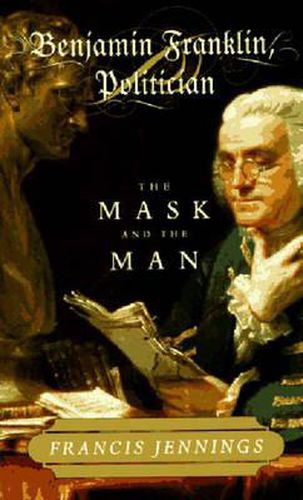Readings Newsletter
Become a Readings Member to make your shopping experience even easier.
Sign in or sign up for free!
You’re not far away from qualifying for FREE standard shipping within Australia
You’ve qualified for FREE standard shipping within Australia
The cart is loading…






A distinguished historian of early America sees Franklin’s influence on the course of the revolutionary movement in a new light. Benjamin Franklin was a man of genius and enormous ego, smart enough not to flaunt his superiority but to let others proclaim it. To understand him and his role in great events, one must realize the omnipresence of this ego, and the extent to which he mirrored the feelings of other colonial Pennsylvanians. With this in mind, Francis Jennings sets forth some new ideas about Franklin as the first American. In so doing, he provides a new view of the beginnings of the American Revolution in Franklin’s struggle against William Penn. By striving against Penn’s feudal lordship (and therefore against King George) Franklin became master of the Pennsylvania assembly. It was in this role that he suggested a meeting of the Continental Congress which, as Jennings notes, flies in the face of historical opinion which suggests that Boston patriots had to drag Pennsylvanians into the revolution. Franklin’s autobiography omits discussion of his heroic struggle against Penn and, in so doing, robs history of his true role in the making of the new country. It is through an accurate accounting of what Franklin did, not what he said he did in his autobiography (which Jennings likens to a campaign speech), that we understand the author’s use of the term first American.
$9.00 standard shipping within Australia
FREE standard shipping within Australia for orders over $100.00
Express & International shipping calculated at checkout
A distinguished historian of early America sees Franklin’s influence on the course of the revolutionary movement in a new light. Benjamin Franklin was a man of genius and enormous ego, smart enough not to flaunt his superiority but to let others proclaim it. To understand him and his role in great events, one must realize the omnipresence of this ego, and the extent to which he mirrored the feelings of other colonial Pennsylvanians. With this in mind, Francis Jennings sets forth some new ideas about Franklin as the first American. In so doing, he provides a new view of the beginnings of the American Revolution in Franklin’s struggle against William Penn. By striving against Penn’s feudal lordship (and therefore against King George) Franklin became master of the Pennsylvania assembly. It was in this role that he suggested a meeting of the Continental Congress which, as Jennings notes, flies in the face of historical opinion which suggests that Boston patriots had to drag Pennsylvanians into the revolution. Franklin’s autobiography omits discussion of his heroic struggle against Penn and, in so doing, robs history of his true role in the making of the new country. It is through an accurate accounting of what Franklin did, not what he said he did in his autobiography (which Jennings likens to a campaign speech), that we understand the author’s use of the term first American.